Few are the girls who never dreamed of becoming an actress, a movie star, a Hollywood icon. Even fewer are the girls who never swooned over a hot movie star. Whether we like it or not, Hollywood is still the film-making capital of the world, and if you look at many of today’s starlets you would believe that all it takes is a nice face and a lot of well-placed silicone. However, Hollywood became the stuff of dreams decades ago when the movie stars were larger than life. This series is about the Golden Era of Hollywood and the legends on whose blood, sweat and talent the success of the modern film industry was built upon.
Almost thirty years after her death, Marlene Dietrich is still one of the most fascinating movie stars, with books, exhibitions and documentaries trying to capture and decipher her inimitable style. Over the past few years, prestigious museums on both sides of the Atlantic have put up exhibitions of her famous figure-hugging dresses alongside the tuxedos she used to perform in, two contrasting images of an actress who was well ahead of her time. And a very complicated time for a German-born star, who, nevertheless, placed herself on the good side of history.
Born in Berlin in 1901, Marlene Dietrich had a traditional, rather strict, Prussian education, typical for middle-class German families of the time. She studied violin as a teenager, but she was also interested in poetry and acting. Defying her family’s expectations, she pursued an acting career, making her debut in ‘The Little Napoleon’ (1923), followed quickly by her first significant part in ‘Tragedy of Love’. It is while filming the latter that she met producer Rudolf Sieber, whom she married the same year. They had a daughter together, Maria, Dietrich’s only child. A few years later they separated, but remained good friends and never divorced.
Her real breakthrough came in 1929, with ‘The Blue Angel’, movie that was released both in German and in English, making her famous in the US as well. This movie was her first project with director Josef von Sternberg, a man who would soon become her lover and would play a crucial role in her life. It was Sternberg who first cast her as a cabaret singer, a career she would actually embrace after her acting career had peaked. Sternberg also helped her polish her image, starting with simple things like dying her hair blonde and dropping a few pounds, and ending with giving her the androgynous look that would make her famous. Much has been said about her preference for masculine costumes (she actually bought her trousers in men’s stores), but the truth is it was only an act. Since ‘The Blue Angel’, that was the Dietrich image and the following years all she did was polish it.
“I dress for the image. Not for myself, not for the public, not for fashion, not for men. The image? A conglomerate of all the parts I’ve ever played on the screen.(…) If I dressed for myself I wouldn’t bother at all. Clothes bore me.”
Marlene Dietrich’s meeting with Sternberg would also prove crucial as she will follow him to Hollywood, in 1930, leaving Germany just before the Nazis’ rise to power. Had she not done that she might have ended as a propaganda tool for Hitler, like the infamous film-maker Leni Riefenstahl. Dietrich was only one year older than Riefenstahl and for a time they moved in the same Berlin circles for a while, as this picture below stands proof.
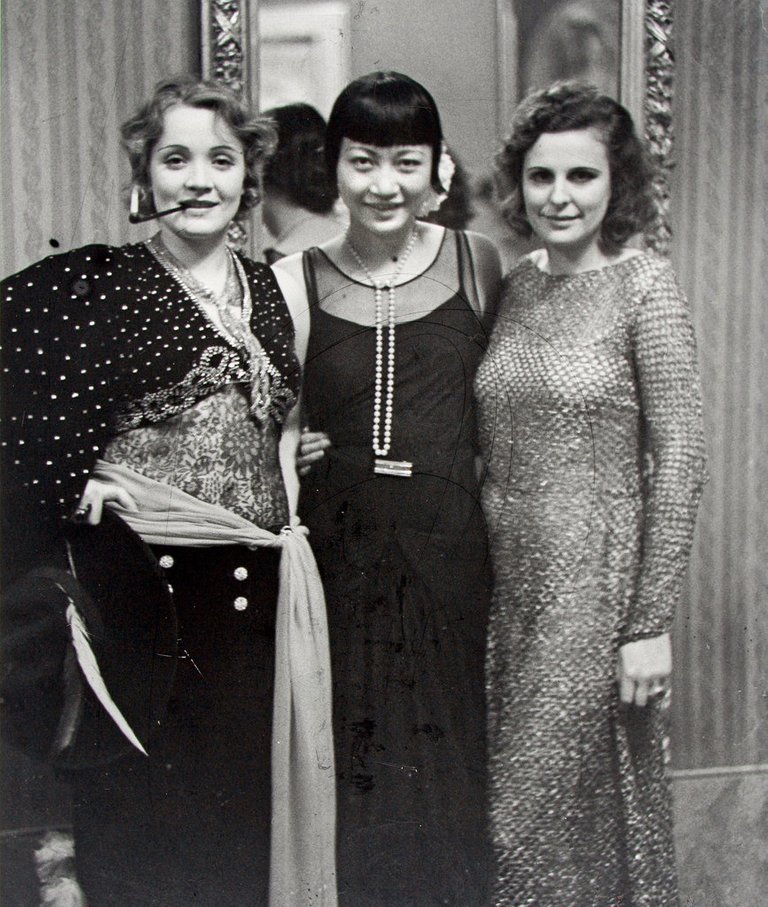
Crazy 20s in Berlin, Dietrich (left) with Riefenstahl (right).
Source
When Dietrich became a famous Hollywood diva, Nazi officials tried to lure her back to Germany with promises of lucrative contracts, but she refused and in 1937 applied for American citizenship. Not only that, for Dietrich chose to take an active part in the US war efforts, touring the country to collect funds and recording propaganda messages the US broadcast to the German troops via radio transmissions. She also made the famous recording of a song aimed at German troops, which became a huge success, even among American troops. ‘Lili Marlene’ is a song about a soldier dreaming of the girl he left behind and the time they kissed under the streetlight. Due to its popularity, it became the theme-song of the German-language broadcast of the US secret service radio station. Later on, when she toured the world with her cabaret act, Marlene Dietrich performed the song at almost every show.
‘Lili Marlene’ can also be heard briefly in the famous ‘Judgment at Nuremberg’ movie, in a scene where Dietrich appears alongside Spencer Tracy. During the war, a large part of her earnings were donated to help artists escape Hitler’s Germany.
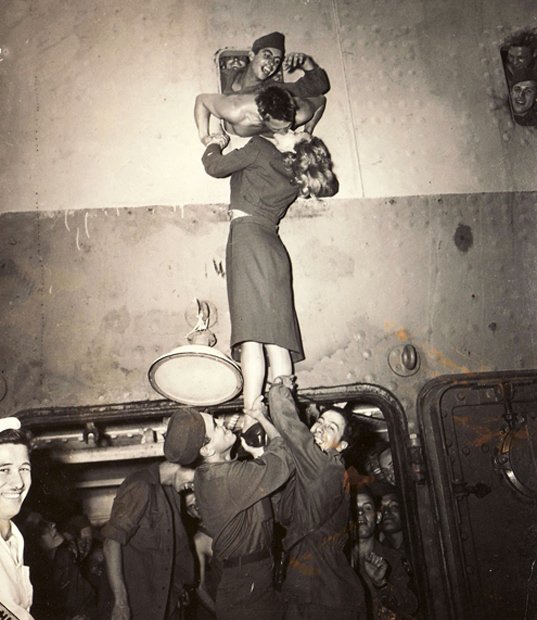
Dietrich's famous kiss with a soldier coming home from the war
Source
Back to the 1930s and Dietrich’s Hollyood career, it must be said that her most successful films were those made with Sternberg as director. Their first US film, ‘Morocco’(1930) also saw her portraying a cabaret singer, wearing a man’s white tie and kissing another woman, both actions being very provocative for that time. While ’Shanghai Express’ (1932) was their highest-earning movie, Dietrich was most happy with ’The Devil is a Woman’(1935), as she was convinced she was at her most beautiful in that movie.
Her carefully crafted public image of ‘femme fatale’ actually mirrors her private life, Marlene Dietrich being famous for her long list of conquests. She had affairs with many of her co-stars, including Cary Grant and Douglas Fairbanks, but also personalities like John F. Kennedy, Frank Sinatra and writer Erich Maria Remarque. One of the most important relationship was with actor Yul Brynner, their affair lasting for a decade.
After WWII, her career waned and as she was getting a bit too old for Hollywood she started touring the world with her cabaret show, which was extremely popular. It wasn’t until the 1960s that she was allowed to set foot on German soil again and even then there were those who opposed her return, due to her involvement with the US war effort.
Marlene Dietrich’s influence as a style-icon can be seen, for instance, in Madonna’s obsession with copying her clothes and looks. In the 1980s there were plans for a remake of ‘The Blue Angel’, with the American pop-star playing Dietrich’s part. The project was abandoned and it’s been said Marlene Dietrich abhorred Madonna, whom she considered vulgar and trashy.
Marlene Dietrich’s show-business career ended in 1975, after a fall on stage left her with a broken thigh. Dietrich spent her last years in Paris, completely retired from public life. She died of renal failure in 1992, aged 90. Her funeral was huge, with thousands of mourners gathered in and around the church. It wasn’t just ordinary citizens or movie fans, as many political figures paid their respects to a woman noted for her strong anti-Nazi views.
Many ambassadors attended the ceremony which saw her coffin draped in the French flag and adorned with a flower-bouquet sent by president Francois Mitterrand. Later, her remains were moved to Berlin, according to her wishes.
Most befitting for a such a brilliant personality, an asteroid belt was renamed Marlene 1010, in her honor.
Post authored by @ladyrebecca.
References: Marlene Dietrich Biography, ‘Dietrich & Riefenstahal’.
Click on the coin to join our Discord Chat

Witness proposal is here:
Go To Steem Witness Page
In the bottom of the page type: adsactly-witness and press vote.

Use small letters and no "@" sign. Or, click here to vote directly!
Thank you!
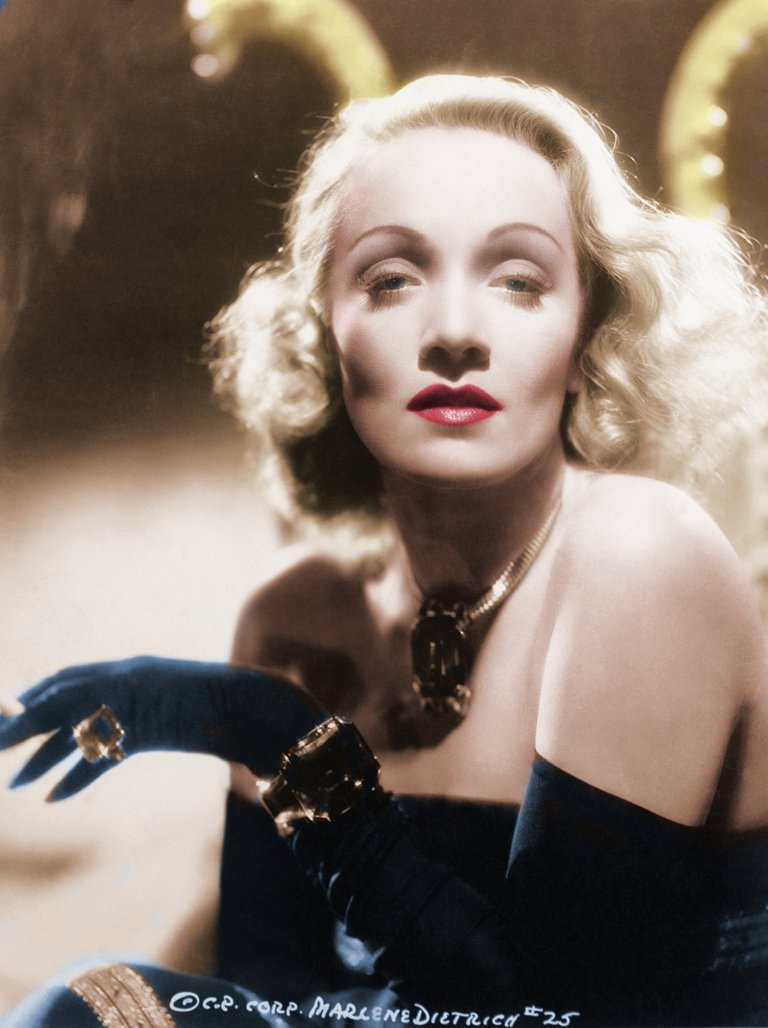
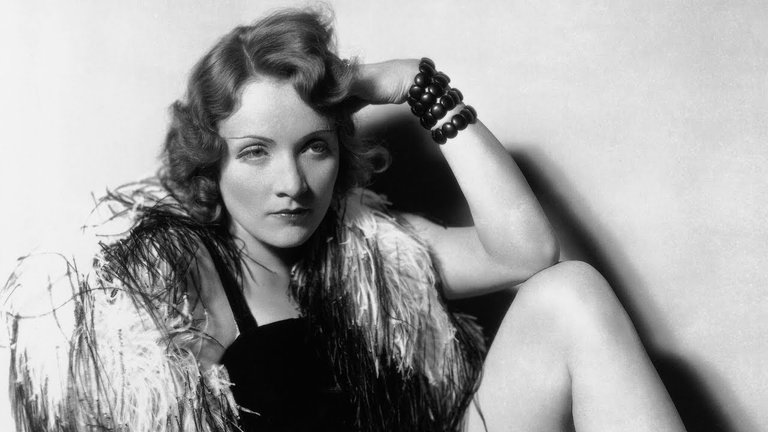
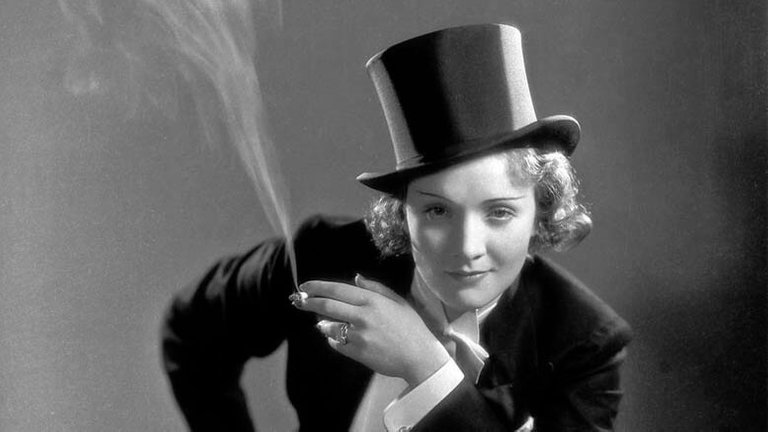
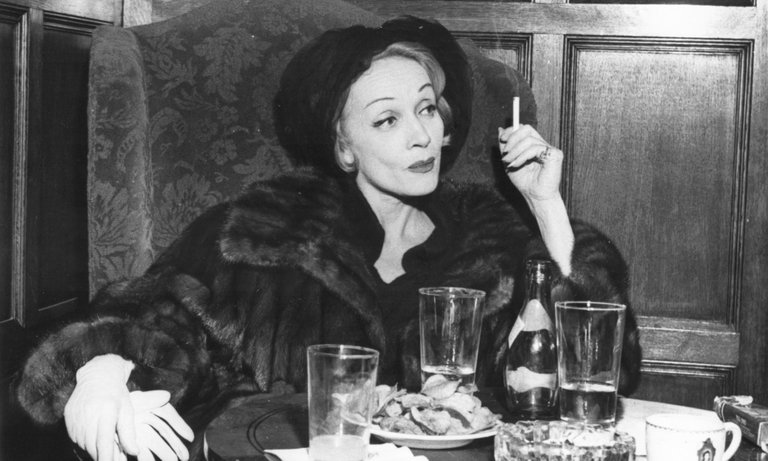

Interesting biography of Marlene Dietrich. A life full of fabulous experiences. Sympathetic the fact that popularized a song between American and German military. It is also striking that his name has been placed on an asteroid belt, Marlene 1010. No doubt a star even in the sky. Thanks for sharing.
From the moment I got to know that famous photo by Marlene Dietrich where, in a cabaret suit, she showed her sexy legs, emblematic of The Blue Angel, I became - perhaps 50 years after the film was made - an admirer of her. More so when I learned about her antinazi attitude and that beautiful gesture of the song dedicated to the German soldiers. It is a gesture that I associate, in anti-war and humanist value, to the realization of that moving film that Chaplin made, The great dictator. I also remember watching with great interest the film "Lili Marleen* by German filmmaker Rainer Fassbinder, one of my favourites (to which I will dedicate a post on this blog at some point).
Thank you for your gratifying post, @ladyrebecca. Greetings.
Oh, I love that movie!
Posted using Partiko Android
Marlene Dietrich, beautiful, daring and controversial. An exceptional woman in her time. Excellent review of her life and career as an actress and singer. Thank you for sharing it, @ladyrebecca.
Thanks to @adsactly for spreading it.
From the moment I got to know that famous photo by Marlene Dietrich where, in a cabaret suit, she showed her sexy legs, emblematic of The Blue Angel, I became - perhaps 50 years after the film was made - an admirer of her. More so when I learned about her antinazi attitude and that beautiful gesture of the song dedicated to the German soldiers. It is a gesture that I associate, in anti-war and humanist value, to the realization of that moving film that Chaplin made, The great dictator. I also remember watching with great interest the film "Lili Marleen* by German filmmaker Rainer Fassbinder, one of my favourites (to which I will dedicate a post on this blog at some point).
Thank you for your gratifying post, @ladyrebecca. Greetings.
Marlene Dietrich was always a great diva, eccentric, daring and that androgynous or masculine game that many have wanted to imitate and that created trend! At some point it was said that she wore a better suit than men and even that she was a nymphomaniac, which led her to carry the title of fatal woman and to be an icon of homosexuals. After reading this post it is clear to me that J. F. Kennedy liked blondes. Thanks for the nice post, @ladyrebecca. I enjoyed it!